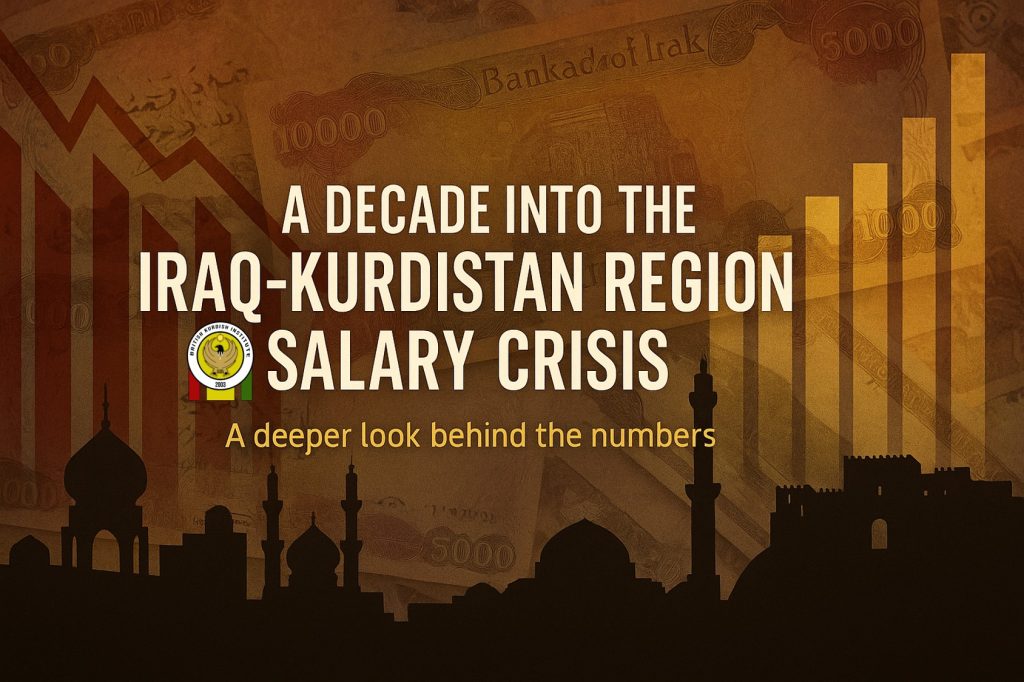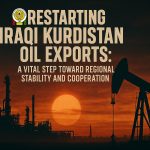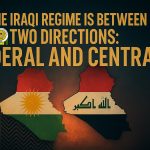Key takeaways (30-second read)
-
The gap between Baghdad’s hiring/pay practices and the Kurdistan Region’s realities has widened over 10 years.
-
Federal Iraq added 1.18M+ civil servants in a decade; the Kurdistan Region’s public payroll shrunk by ~19,339.
-
Durable solutions require transparent data and either internal fiscal redesign in the Kurdistan Region or time-bound, decision-maker-level negotiations with Baghdad.
How we got here
In late May, Iraq’s Federal Ministry of Finance issued a letter asserting the Kurdistan Region’s full-year expenditures—salaries included—were already covered, despite only four months of disbursements. That conclusion was derived by juggling three years of the Region’s budget shares and aggregating Iraq’s post-2015 debt—a numerical shortcut to justify cutting the Region’s budget.
But the salary crisis predates that letter and has dragged on for a decade. To understand the true scope, we have to go back to basics and examine the data.
By the Numbers (2013 → 2025)
| Metric | 2013 | 2023/2025 | Change / Note |
|---|---|---|---|
| Public employees (Iraq + Kurdistan Region) | 2,907,776 | 4,074,697 | Total workforce up |
| Kurdistan Region employees | 677,528 (23%) | 658,189 (16.15%) | Down in count and share |
| Federal new hires (10 yrs) | — | 1,182,260+ | Substantial increase |
| Kurdistan Region net change (10 yrs) | — | –19,339 | Net reduction |
| Federal Health workforce | 227,166 | 488,550 | +261,384 |
| Kurdistan Region Health | — | 11,000+ volunteers | Reliance on unpaid volunteers |
| Federal Education workforce | 614,613 | 963,949 | +319,336 |
| Kurdistan Region Education | — | 37,930 non-contract → contracted (2024) | Paid from internal revenues |
| Total salaries (Iraq + KR), 2013 | IQD 42.588T (~$30.4B) | — | Baseline |
| Total salaries, 2023 (excl. KR) | — | IQD 47.217T (~$33.7B) | Up IQD 4.627T |
| Total salaries, 2012 → 2024 | IQD 35.849T → IQD 60.053T | Long-term surge | |
| KR allocation (Jan–Apr 2025)* | — | IQD 3.664T (~$2.6B) | From MoF letter |
| PMF (same 4 months)* | — | IQD 1.503T (~$1.06B) | Reported figure |
On-the-ground reality
-
Education in the Kurdistan Region: For years, 37,930 non-contract teachers worked without status; they were contracted only in 2024, earning IQD 400k–500k monthly (~$286–$357), paid exclusively from the Region’s internal revenues.
-
Health in the Kurdistan Region: The system leans on “continuous committed volunteering,” with 11,000+ volunteers serving without formal hire or stipends.
-
Federal Iraq: Over the same decade, hiring boomed—319,336 added in education and 261,384 in health—while staff in these sectors did not face salary delays.
-
Security (federal): Interior rose from 661,914 → 701,446; Defense from 322,297 → 453,951; combined +171,186.
Meanwhile, May salaries remain unpaid in the Kurdistan Region, even as federal retirees elsewhere in Iraq received June pensions.
Budget tensions in 2025
Under the current three-year budget (2023–2025), the Kurdistan Region’s share is 12.67%. By end-April 2025, the Region’s allocation for operating expenses (excluding investment) totaled IQD 3.664T (~$2.6B). That figure included deductions for Iraq’s accumulated debt since 2015, despite those debts not being incurred on behalf of the Region.
Population: 6,370,688 (latest census).
Non-oil revenues: ~IQD 2.07T in the first half of 2023 (avg. IQD 345B/month) → down to IQD 50.5B by April 2025.
The core question
If total salary outlays (Iraq + KR) climbed from IQD 35.849T (2012) to IQD 60.053T (2024)—an increase of IQD 24.205T (~$17.2B)—what explains the addition, and how should the Kurdistan Region respond?
Two strategic paths to a durable fix
1) Internal fiscal redesign in the Kurdistan Region
-
Publish monthly inflow/outflow reports (revenues vs. expenditures).
-
Draft and release a transparent, line-item KRG annual budget.
-
Normalize contracts and cash-flow management in education and health.
Outcome: Credibility, better fiscal governance, simpler settlement with Baghdad.
2) Time-bound, data-driven negotiations with Baghdad
-
Use 20 years of data, with actual decision-makers at the table.
-
Tackle structural files: oil & gas, a fair operational + investment share, and formal integration of the KRG budget within Iraq’s annual budget.
-
Resolve pending constitutional/institutional items (e.g., Federal Council, Article 140, compensation, division of powers).
Whichever path wins, transparency, fairness, and accountability are non-negotiable.
Conclusion
Iraq and the Kurdistan Region need more than ad hoc transfers: they need constitutional clarity and fiscal discipline. Without a binding roadmap, the cycle of post-election deals will repeat, as seen with promises (e.g., an oil & gas law within six months) that never reached even draft form.
If federalism is to function, timely, meaningful action must repair Baghdad–Erbil financial relations. If, however, the constitutional foundations have been effectively abandoned, the Kurdistan Region should restructure internally—prioritizing transparency, self-reliance, and structural reform to stabilize essential services and salaries.
FAQ
What is the Kurdistan Region’s current budget share?
Under the 2023–2025 federal budget, 12.67%, though deductions and accounting methods have triggered recurring disputes.
Why did national salary spending rise even as KR headcount fell?
Aggressive federal hiring (education, health, security) and higher pay/benefits drove aggregate costs up, regardless of delayed or absent transfers to the Region.
Is a court ruling alone enough?
Unlikely. Without time-bound execution and public data transparency, rulings have not resolved the structural drivers of the crisis.
What should be prioritized immediately?
A public monthly dashboard of KR revenues/expenditures and deadline-based talks with Baghdad focused on oil & gas and a fair share of investment as well as operational spending.









